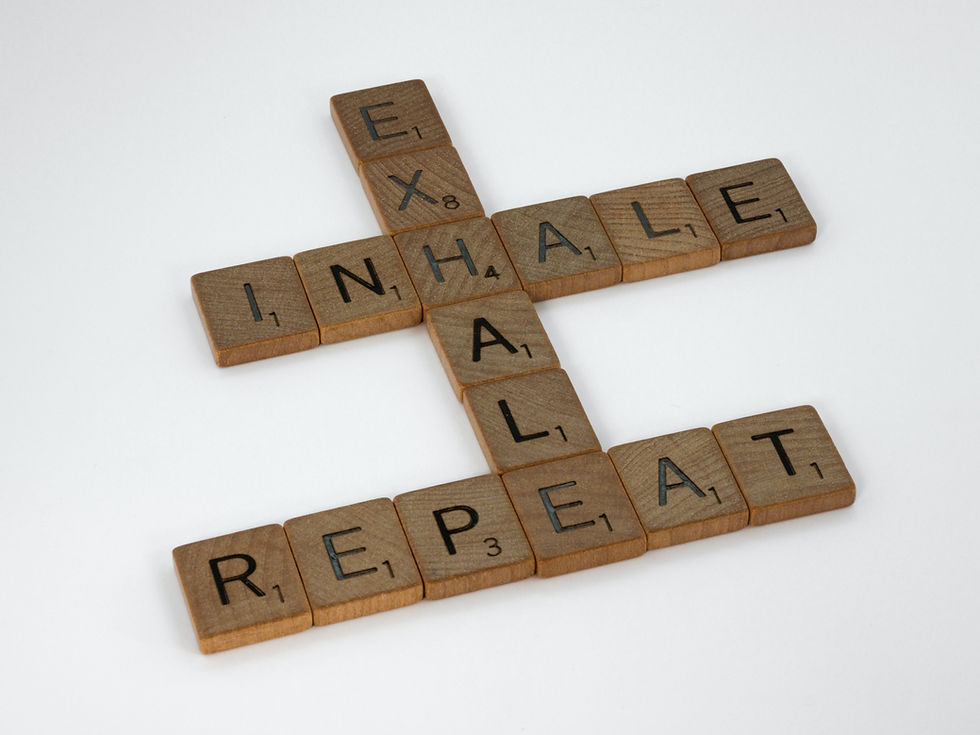5 Effective Stress Management Tips for Menopausal Health
- melaniemully
- Apr 8
- 5 min read

Have you ever noticed how everything just feels that bit harder lately? The overwhelm. The low mood. That constant sense of "being on edge" that never quite goes away. You’re not alone.
April is Stress Awareness Month — a perfect time to talk about something that affects so many women in their 40s and 50s: how stress, hormones, and menopause are deeply linked.
Many women find that as they approach perimenopause and menopause, their tolerance for stress takes a nosedive. What once felt like a minor hiccup can suddenly feel like a full-blown crisis. This isn’t just in your head—there’s a scientific reason for it.
Let’s break it down.
Why You Feel More Stressed in Midlife
Your stress response is controlled by the adrenal glands, which produce key hormones like adrenaline and cortisol. These are your body’s “fight or flight” hormones—meant to protect you in short-term danger. But in our modern world, stress tends to be chronic. Constant pressure, busy lives, emotional load, sugar-laden diets, poor sleep… they all add up.
Now, here’s where it gets more interesting.
During perimenopause, your ovaries begin to slow their production of oestrogen and progesterone. Your adrenal glands are meant to pick up some of the slack. But if they’re already working overtime pumping out stress hormones? There might not be enough capacity left to produce the calming, balancing hormones your body needs.[1]
That’s why managing stress isn’t just about feeling calmer—it’s about protecting your hormone health too.

The Impact of Stress on Menopausal Symptoms
Fluctuating hormones can already feel like an emotional rollercoaster. Add in unmanaged stress and the effects can really pile up:
Hot flushes and night sweats – Stress activates the nervous system, making these symptoms more frequent or intense.
Sleep problems – Low oestrogen can disrupt sleep, and stress adds fuel to the fire, especially if your mind won’t switch off at night. It’s a recipe for wide-awake-at-3am nights!
Mood swings – Anxiety, low mood, and a shorter fuse can all be heightened by high cortisol levels.
Weight gain – Stress encourages fat storage around the middle, where the body can convert fat into oestrogen. Add cravings for sugar and carbs, and it becomes a vicious cycle.
Brain fog and low energy – Chronic stress impacts memory, concentration, and motivation.
Digestive issues – Bloating, constipation and indigestion are common, as stress diverts energy away from your digestive system.
So What Can You Do?
The good news? I know you've heard it before but small, consistent changes really can make a big difference. You don’t need a total life overhaul—just a few nurturing habits to support your body and mind.
1. Eat to balance your blood sugar
When you eat sugary snacks or skip meals, your blood sugar crashes and cortisol jumps in to stabilise things—keeping you stuck in a stress cycle. Aim for:
Whole, unprocessed foods
Good-quality protein (eggs, fish, lean meat, lentils)
Plenty of colourful veg
Healthy fats (avocado, nuts, seeds, olive oil)
And try not to go more than 3–4 hours without food.
2. Reduce your stimulants
Caffeine and alcohol can put extra strain on your adrenals and interfere with sleep. Try swapping that afternoon coffee for a calming herbal tea a few times a week.
3. Move your body—gently
Exercise is brilliant for releasing tension, lifting your mood and supporting hormone balance. But it doesn’t need to be punishing. Brisk walking, dancing, yoga, Pilates, and strength training are all great choices. The key is consistency and enjoyment.
4. Prioritise rest and relaxation
Easier said than done, right? But even 5–10 minutes of intentional downtime can help lower cortisol and reset your nervous system.
Try breathwork or guided meditation (apps like Calm or Insight Timer are great)
Spend time in nature
Journal your thoughts or list 3 things you’re grateful for
Listen to music, garden, or get creative
5. Understand your stress triggers
Awareness is half the battle. What tends to set you off? What helps you come back to calm? Having a go-to list of soothing tools can help you feel more in control when stress hits.

Tips to Reduce and Prevent Stress
While it’s important to recover from stress, it’s equally powerful to prevent it where you can. And that starts with knowing how to respond when life feels overwhelming.
That’s where P.I.P. comes in to play. It’s a simple, three-step tool, to help you press pause, get clear, and take calm action.
P.I.P. – Pause. Identify. Prioritise.

Pause
Just stop. Take a moment. Breathe in through your nose, out through your mouth. Even one slow breath can help signal to your nervous system that you’re safe.
Identify
Ask yourself: What exactly is stressing me out right now?
Is it one big thing or a pile of smaller things? Naming it helps you feel more in control.
Prioritise
Not everything is urgent. Not everything needs to be done right now. Some things don’t even need to be done at all. This is where the 4 Ds come in...
The 4 Ds of Task Management
These are brilliant when you’re feeling overwhelmed by your to-do list or spinning too many plates:
Delete – Let go of tasks that don't actually matter. Are you holding onto jobs out of guilt or habit? If it’s not essential, it can go. Give yourself permission to drop it – do you really need to iron your teenager’s school uniform? Nope.
Defer – Some things can wait. Pick a realistic date to come back to it—and park it until then.
Delegate – You don’t have to do everything yourself. Can a partner, child, friend or colleague help? Sharing the load is a strength, not a weakness.
Do – Focus on what matters most today. Just one thing, if that’s all you’ve got energy for. That’s okay.
Using this approach regularly helps prevent build-up stress and keeps things more manageable—even when life gets busy.

You’re Not Meant to Do This Alone
Midlife is a time of enormous change, but it can also be a powerful time of growth and reconnection—with yourself and your needs. By looking after your stress response, you’re not just easing menopause symptoms—you’re supporting your future health and wellbeing too.
So if you’ve been feeling anxious, foggy, tired or just not quite like yourself lately… be kind to yourself. There is a reason. And there is support.
Start with one small step today. What’s one thing you can do to support your body and calm your mind?

References
“The Menopause Charity,” 4 4 2023. [Online]. Available: https://themenopausecharity.org/2023/04/04/menopause-and-stress/.
PIP and 4Ds ideas taken from an IHASCO training course on Stress Awareness






Comments